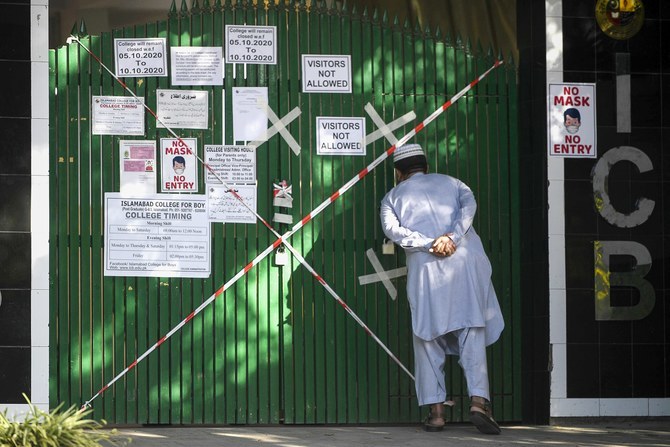ISLAMABAD: Pakistani authorities on Monday ordered the closure of all educational institutions from November 26 until January 11 to curb the spread of the coronavirus disease in the country, amid fears of a second wave of the deadly outbreak.
It follows a meeting chaired by Planning Minister Asad Umar after the National Command and Operation Center (NCOC) recorded the highest COVID-19 positivity ratio, at 7.46 percent, on Monday, with 19 percent of the cases reported from the education sector.
The NCOC is a government-appointed body for the prevention and control of the coronavirus disease.
After the NCOC meeting on Monday, Education Minister Shafqat Mahmood told a press briefing that officials had decided to shut down all educational institutions for six weeks – from November 26 to December 24 – based on an assessment of the COVID-19 situation in the country.
“From December 25 to January 10, there will be winter vacations and all educational institutions would be completely closed," Mahmood said.
He added that provincial governments would "decide on a mechanism wherever possible", and that all efforts would be made to ensure students continued learning online.
The government is expected to review the situation in the first week of January and "hoped" to reopen all educational institutions from January 11, Mahmood said.
As an additional measure, he said that examinations scheduled for December had been postponed, with the meeting recommending that all board exams slotted for March or April be moved to May or June instead.
“We have also recommended that the new academic year that begins in April at government schools be postponed till August and summer vacations are reduced," he added.
However, Special Assistant to the Prime Minister on Health Dr Faisal Sultan said that "professional exams" would be held on schedule "because those can be managed with standard operating procedures (SOPs)".
Pakistan first shut down all of its schools and colleges in March after enforcing a nationwide lockdown to contain the spread of the coronavirus disease.
Authorities, however, began easing restrictions in May and eventually allowed almost all businesses and the tourism sector to reopen in the months that followed.
Schools and educational institutions were finally allowed to reopen in phases from September 15 onwards.
However, for the past several weeks, authorities have been sounding the alarm over a second wave of the coronavirus outbreak.
More than 34 deaths and 2,756 cases were recorded on Monday, taking the national caseload to 376,929 infections and 7,696 deaths since the outbreak was first reported in March, according to government data.
















